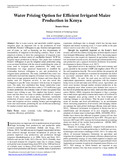| dc.contributor.author | Otieno, Dennis | |
| dc.date.accessioned | 2021-08-17T08:33:31Z | |
| dc.date.available | 2021-08-17T08:33:31Z | |
| dc.date.issued | 2021-08 | |
| dc.identifier.citation | International Journal of Scientific and Research Publications, Volume 11, Issue 8, August 2021 310 ISSN 2250-3153. DOI: 10.29322/IJSRP.11.08.2021.p11640
http://dx.doi.org/10.29322/IJSRP.11.08.2021.p11640 | en_US |
| dc.identifier.issn | 2250-3153 | |
| dc.identifier.uri | http://hdl.handle.net/123456789/4797 | |
| dc.identifier.uri | http://www.ijsrp.org/research-paper-0821/ijsrp-p11640.pdf | |
| dc.description.abstract | Due to water scarcity and unreliable rainfall regimes, irrigation plays an important role in the production of food worldwide. Farmers’ willingness to pay, Scarcity and opportunity cost of water, as well as financing are key determinants of sustainability of irrigation in developing countries. There is little empirical evidence to show the consequences of irrigation water pricing based on direct survey of smallholder farmers’ WTP for irrigated maize production in Kenya. This paper thus evaluated farmers’ willingness to pay for irrigated maize production using cross sectional field data with the aim of establishing the value of water used in irrigated maize production. The study used Heckmanns two stage analytical framework to establish the relationship between willingness to pay and productivity of irrigated maize production. The study established that water was inefficiently used and that majority of farmers were willing to pay more than average payment made by farmers and lower than the market rates for irrigation services. It was also noted that willingness to pay for water increased with increase in irrigation rates. The study also established that farmer undervalue water when it is subsidized and that there exists a 71% inefficiency gap in maize production. the economic value of water was greater than farmers were willing to pay. This implied that farmers wasted
water and that there was scope to enhance profitable of irrigated maize if only water was priced justly. Therefore, sustainable production of maize requires charging farmers market rates for water and irrigation services, training farmers and strengthening water user associations, promoting the use of efficient technology for market oriented maize production. | en_US |
| dc.language.iso | en | en_US |
| dc.subject | Water, economic value, willingness to pay, irrigation, efficiency, profitability | en_US |
| dc.title | Water Pricing Option for Efficient Irrigated Maize Production in Kenya | en_US |
| dc.type | Article | en_US |

